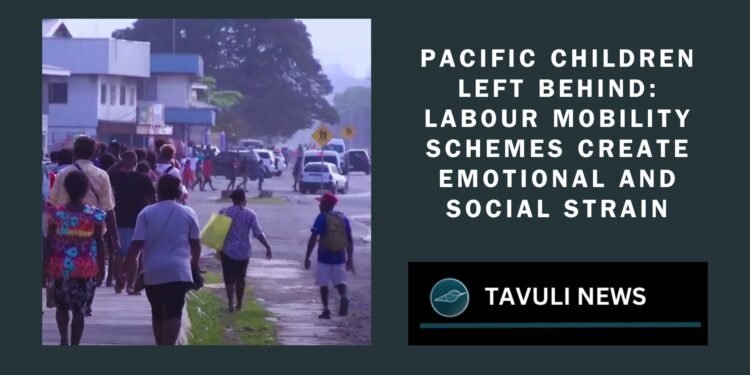Children Face Severe Challenges as Caregivers Move Abroad Shifting Caregiving Burden to Children and Elderly.
Across the Pacific, children are facing severe emotional and social challenges as labour mobility schemes draw their caregivers abroad, leaving families fragmented. A new study reveals that children left behind in countries like Fiji, Samoa, the Solomon Islands, and Vanuatu are struggling with disrupted family structures, falling education standards, and increasing mental health issues.
As more Pacific workers leave for seasonal employment in Australia and New Zealand under schemes like the Recognised Seasonal Employers (RSE) and Pacific Australia Labour Mobility (PALM), the caregiving burden has shifted dramatically. Grandparents, older siblings, and extended family members are taking on primary caregiving roles, with some young children themselves stepping into these responsibilities. This sudden shift has caused immense stress within families, particularly in rural communities where support systems are weak.
Schools in these countries report falling literacy and numeracy rates as children increasingly skip school to handle domestic duties or work to support their families. The lack of adult supervision and emotional support has left many young people feeling neglected, and their mental health is suffering as a result.
The report indicated that the situation is bleak for many children where they fall behind in their education and become emotionally distressed. These labour mobility schemes though brought in income, the social cost is high, and children are the ones paying the price.
The prolonged absence of caregivers has also led to family breakdowns, with cases of extramarital affairs, and legal disputes over child maintenance becoming more frequent. Many families, unprepared for the long separations, struggle to maintain consistent communication with loved ones abroad. In some cases, court orders for child support are not enforced, leaving children without essential resources.
One of the most alarming findings is the mismanagement of remittances. While families receive income from their relatives working abroad, this money is often spent on daily expenses rather than being saved or invested for long-term benefits. The financial instability puts children at risk, with insufficient funds to meet their education, healthcare, and emotional needs.
In response to these challenges, experts are urging Pacific governments to implement family-focused pre-departure training programs, ensuring that families understand how to manage remittances and maintain strong communication with their absent relatives. The study recommends that governments also address the logistical issues that make remittance transfer difficult, especially in rural areas.
Moreover, the report highlights the need for increased investment in child protection services and the inclusion of churches and non-governmental organizations to provide mental health and pastoral care. With so few social safety nets in place, these community institutions are often the only lifeline for struggling families.
Gender roles in Pacific communities are also being reshaped. With men away for extended periods, women are taking on responsibilities traditionally considered men’s work, often while still managing household and childcare duties. This added burden has left many women overwhelmed, and in some communities, the absence of men has changed the social fabric.
As Pacific Island nations continue to depend on labour mobility schemes to boost their economies, experts warn that without better protections in place, the social costs—particularly for children—could outweigh the financial benefits.
UNICEF, which conducted the study, is calling for urgent reforms to the labour mobility schemes to ensure that the children left behind are not overlooked. Governments are encouraged to strengthen their child protection systems, provide social safety nets for families, and create support networks to ensure the wellbeing of Pacific children.














































































